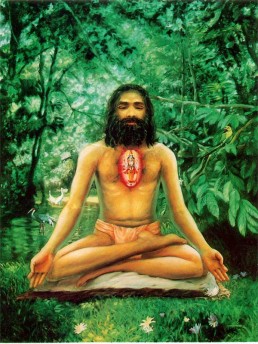Swami Chinmayananda Commentary
As we have just indicated in the previous stanza, when an individual’s mind has been arrested from its agitated roamings in the world-of-objects, and fixed consistently upon the Self, by degrees the mind gathers more and more quietude and ultimately, when the flow of thoughts ceases, the mind also ends. Where the mind has ended, there the individual is awakened to the experience of the Infinite Nature of the Self. Naturally, the Meditator (Yogin) “COMES TO THE SUPREME BLISS.”
An intelligent enquirer has every right to question this assertion; for, in a true science, the scientist has no right to assert his own opinion and to expect the students to swallow it. In the second line of the verse, the reasons are given to show how and why the quietened mind becomes an open-window through which the prospect of the Self comes to our view. A mind, thus held steadily in the inner atmosphere of thrilled silence, comes to drop off all its previous vasanas; the mind gets “FREED FROM TAINT” (A-kalmasham).
In Vedanta, technically the “impurities” of the mind are called mala, and it is considered as constituted of “SPIRITUAL NON-APPREHENSION” and the consequent “MENTAL AGITATIONS.” The “veiling power” (Avarana) generated by the inertia of the intellect (Tamas), creates in its wake the disturbing “agitations” (Vikshepa) in the mental zone. The agitation-nuisance in the mind is most prominent when it is under the influence of Rajo-guna. This Vedantic theory, explaining “the fall of man” into sorrow, is fully echoed in the words of the Lord here: (a) “passions quietened” (Shanta-rajasam) and (b) “freed from taint” (A-kalmasham).
An individual in whom all “agitations” have ceased, and consequently, who has become perfectly freed from his “ignorance” of the Reality, should naturally be considered as one who has regained his “Knowledge of the Self.” As long as there is agitation, so long there is the mind; and the Self identified with the mind, is the ego — the seeker who started meditating. When, as it has been explained, the meditator has exposed his mind to the atmosphere of inner peace and quietude, he comes to end completely all his mental agitations, and therefore, the ego rediscovers itself to be nothing other than the Self. This non-dual-Truth has been openly declared by the Lord through His brilliant phrase “Brahman-become” (Brahma-bhootam) in describing the man of Self-realisation.
HAVING THUS EXPLAINED THE ACHIEVEMENTS OF A TRUE MEDITATOR THE LORD EXPLAINS HOW THIS EXPERIENCE OF THE SELF CAN BE, THEREAFTER, THE CONSTANT LIFE OF THE PERFECT ONE:
Adi Sankara Commentary
Uttamam, supreme, unsurpassable; sukham, Blisss; upaiti, comes; hi enam yoginam, to this yogi alone; prasanta-manasam, whose mind has become perfectly tranquil; santa-rejasam, whose (quality of) rajas has been eliminated, i.e. whose rajas, viz defects such as delusion etc. [‘The five klesas, pain-bearing obstructions, are: ignorance, egoism, attachment, aversion, and clinging to life’ (P.Y.Su.2.3).] have been destroyed; brahma-bhutam, who has become identified with Brahman, who is free even while living, who has got the certitude that Bramhman is all; and akalmasam, who is taintless, free from vice etc.
The Bhagavad Gita with the commentary of Sri Sankaracharya – Translated by Alladi Mahadeva Sastry
Holy Geeta – Commentary by Swami Chinmayananda
The Bhagavad Gita by Eknath Easwaran – Best selling translation of the Bhagavad Gita
The Bhagavad Gita – Translation and Commentary by Swami Sivananda
Bhagavad Gita – Translation and Commentary by Bhaktivedanta Swami Prabupadha
Srimad Bhagavad Gita Chapter 6 – Verse 27 – 6.27 prasantamanasam hyenam – All Bhagavad Gita (Geeta) Verses in Sanskrit, English, Transliteration, Word Meaning, Translation, Audio, Shankara Bhashya, Adi Sankaracharya Commentary and Links to Videos by Swami Chinmayananda and others – 6-27

